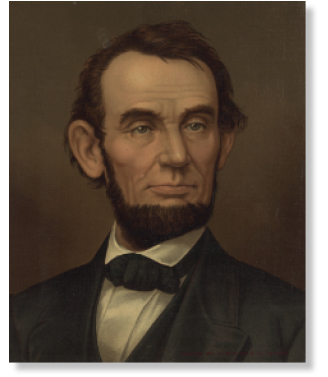Abraham Lincoln

“If all do not join now to save the good old ship of the Union this voyage nobody will have a chance to pilot her on another voyage.”
—from Abraham Lincoln’s speech at Cleveland, Ohio, February 15, 1861
Less than two months after Abraham Lincoln was inaugurated president in 1861, he faced one of the most difficult tasks ever experienced by a U.S. leader—a civil war. No U.S. president before or after faced a graver crisis or emerged with a greater reputation.
Lincoln took his oath of office on March 4, 1861, assuring Southerners he had no quarrel with them. But they had a quarrel with him. Seven Southern states had already seceded and formed the Confederate States of America, presenting the most severe challenge to national authority in the country’s brief history. By mid-April, the first shots were fired in the American Civil War.
Lincoln called the struggle ahead “a people’s contest.” He was determined to preserve majority rule, warning that if democracy was defeated in America, it would surely never rise again anywhere in the world.
When, just a few weeks later, Union forces were crushed at the Battle of Bull Run at Manassas, Virginia, a despairing Lincoln realized that the struggle would be long, costly, and bloody. But he steadfastly rejected suggestions that he abandon the war and let the South leave the Union in peace.
It wasn’t until September 1862, at the Battle of Antietam in Maryland that the Union forces finally triumphed. Lincoln seized on this victory to take a bold step. He issued the Emancipation Proclamation, which freed all slaves in the rebellious states. It would become one of the first steps in the long fight for African American civil rights.
Although emancipation did change history, it did not immediately change the course of the war. Many of the major battles ended as Confederate victories and Lincoln struggled to find a Union general who would stand and fight—he hired and fired them with shocking swiftness in the first years of the war. Meanwhile, antiwar Northerners demanded peace, and a military draft proved highly unpopular. Lincoln also faced a Cabinet that initially questioned his competence to be president and personal tragedy with the death of his son.
Through it all, Lincoln insisted that the Union had to be preserved. He turned political enemies into friends and used wisdom, humor, and patience to rise above the tremendous difficulties he faced.
He also inspired people with his speeches. In November 1863, Lincoln did with words what the army had been unable to do with bullets. In a two-minute speech at Gettysburg, Pennsylvania, he rallied the North to what he called a “new birth of freedom” for America. It remains the greatest presidential speech ever given.
Lincoln’s finest moment may have come at his second inauguration, on March 4, 1865, after he won reelection. In his address, he defended the sacrifice of lives that had been necessary to rid America of the evil of slavery and called for a new era of peace:
“With malice toward none, with charity for all, with firmness in the right as God gives us to see the right, let us strive on to finish the work we are in; to bind up the nation’s wounds; to care for him who shall have borne the battle, and for his widow and his orphan—to do all which may achieve and cherish a just and lasting peace, among ourselves, and with all nations.”
When the war ended a month later, Lincoln began working on plans to reconstruct the devastated Union. As determined as he had been to fight to save the Union, he was just as committed to reuniting and rebuilding the war-torn country. But an embittered Confederate sympathizer, John Wilkes Booth, shot and killed Lincoln in April 1865. Lincoln died at the moment of his greatest triumph.
Photographs and paintings reveal the awful toll taken on Lincoln during the Civil War. He looked like he aged 20 years instead of four. He paid a high personal price, but his calm and resolute leadership saved the Union. We agree with the many historians who consider Abraham Lincoln the greatest U.S. president. He was the best man at a most critical time in American history.
